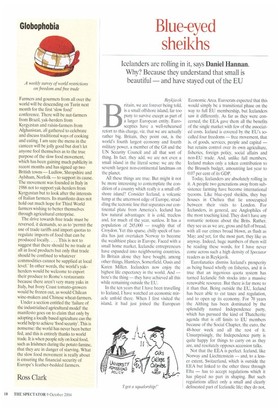Globophobia
A weekly survey of world restrictions on freedom and free trade Farmers and gourmets from all over the world will be descending on Turin next month for the first 'slow food' conference. There will be nut-farmers from Brazil, yak-herders from Kyrgyzstan and raisin-farmers from Afghanistan, all gathered to celebrate and discuss traditional ways of cooking and eating. I am sure the menu in the canteen will be jolly good but don't let anyone fool themselves as to the true purpose of the slow food movement, which has been gaining much publicity in recent months and has signed up two British towns — Ludlow, Shropshire and Aylsham, Norfolk — to support its cause. The movement was founded in Italy in 1986 not to support yak-herders from Kyrgyzstan but to look after the interests of Italian farmers. Its manifesto does not hold out much hope for Third World farmers wishing to better themselves through agricultural enterprise.
The drive towards free trade must be reversed, it demands, so as to 'permit the use of trade tariffs and import quotas to regulate imports of food that can be produced locally. . . . This is not to suggest that there should be no trade at all in food products but only that trade should be confined to whatever commodities cannot be supplied at local level.' In other words, the world's yakherders would be welcome to export their produce to Rome's restaurants because there aren't very many yaks in Italy, but Ivory Coast tomato-growers would be frozen out, as would Chilean wine-makers and Chinese wheat-farmers. Under a section entitled the 'failure of the industrialised agricultural model' the manifesto goes on to claim that only by adopting a locally based agriculture can the world help to achieve 'food security'. This is nonsense: the world has never been better fed, and this is entirely thanks to world trade. It is when people rely on local food, such as Irishmen during the potato famine, that they are in danger of starving. What the slow food movement is really about is ensuring the financial security of Europe's feather-bedded farmers.
Ross Clark


















































































































 Previous page
Previous page